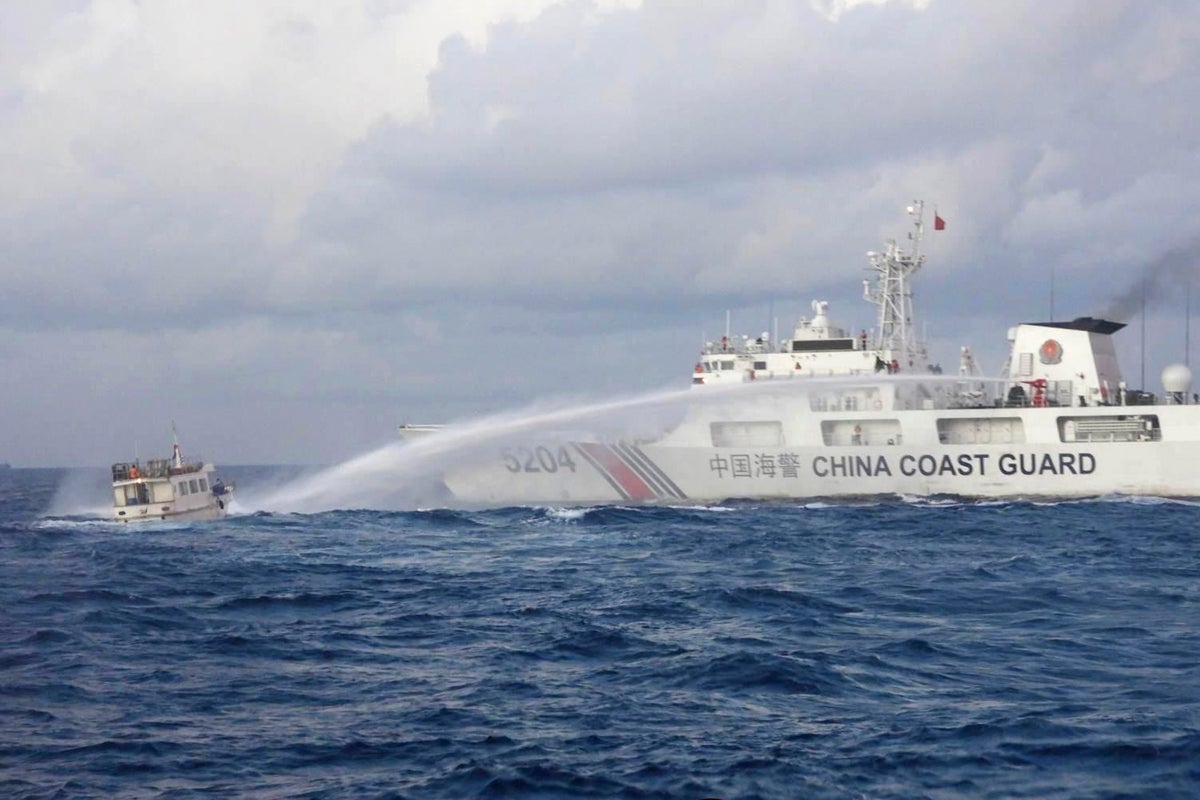
The Philippine military chief said Monday he was with Filipino forces aboard a supply boat when it was blasted with a water cannon and surrounded and bumped by Chinese coast guard ships over the weekend in the disputed South China Sea.
Gen. Romeo Brawner Jr. told The Associated Press in a telephone interview that China was escalating its aggression in the contested waters but said it would not deter Filipino forces from defending the Philippines’ territorial interests in the busy waterway.
More than 100 Chinese government and suspected militia ships have swarmed the high seas around the contested Scarborough Shoal, where a long-marooned Philippine navy ship that Brawner visited has stood for decades. He said the Chinese flotilla was much bigger than in previous months.
“It's pure aggression,” Brawner said of China’s high-seas maneuvers. “I witnessed how many times the big Chinese coast guard and militia ships cut our path. They water-cannoned us, then bumped us. It’s angering.”
“This really needs a diplomatic solution at the higher level,” he said, but added that the Philippine “armed forces will continue our mission because it is lawful and it’s our obligation to bring supplies to our troops in the frontlines, and it’s our obligation to protect our fishermen.”
Brawner, the U.S.-educated chief of the 150,000-member Armed Forces of the Philippines, joined navy personnel in a wooden-hulled supply boat, the Unnaiza Mae 1, which brought Christmas gifts, food and other supplies to a small contingent of Filipino marines and navy personnel stationed aboard the BRP Sierra Madre at the Second Thomas Shoal.
Although now crumbling with rust and holes, the slightly listing BRP Sierra Madre remains an actively commissioned Philippine navy ship, meaning any assault on it would be considered an act of war. It has become a fragile symbol of the territorial claims of the Philippines in the strategic waterway, which China claims virtually in its entirety.
After the Philippines deliberately grounded the Sierra Madre on the shallows of Scarborough Shoal in 1999, China surrounded the atoll with its coast guard, navy and suspected militia ships to isolate the Filipino forces there. The yearslong territorial standoff has flared regularly and become one of the most delicate flashpoints in the South China Sea and a fault line in the U.S.-China regional rivalry.
The United States has repeatedly warned it is obligated to defend the Philippines, its oldest treaty ally in Asia, if Filipino forces, ships or aircraft come under an armed attack, including in the South China Sea. China has warned the U.S. not to meddle in what it says is a purely Asian dispute.
Brawner said he conveyed President Ferdinand Marcos Jr.'s Christmas greetings to the Filipino forces aboard the BRP Sierra Madre, where he shared a traditional rice lunch eaten by hand with them.
Over the weekend, Philippine officials said the Chinese coast guard and suspected militia ships targeted Philippine vessels two days in a row with water cannon blasts and rammed one of them, causing damage and endangering Filipino crew members off the Second Thomas Shoal and separately in the Scarborough Shoal off the northwestern Philippines.
The Philippines, along with the U.S. and Japan, condemned the maneuvers by the Chinese coast guard and accompanying ships.
"We condemn, once again, China’s latest unprovoked acts of coercion and dangerous maneuvers against a legitimate and routine Philippine rotation and resupply mission to Ayungin Shoal that has put the lives of our people at risk,” a Philippine government task force that deals with the territorial disputes said in a statement, using the Filipino name for the shoal.
Philippine officials said the Chinese coast guard’s high-pressure water cannon blasts disabled and severely damaged the engines of the Philippine supply boat M/L Kalayaan, which had to be towed back to the western Philippine province of Palawan.
One of two Philippine coast guard escort ships, the BRP Cabra, sustained damage to its mast due to the water cannon blast.
The Chinese coast guard said it had “implemented controls in accordance with laws and regulations.” The statement gave no details about the measures taken but said the Philippines action “seriously infringed on China’s sovereignty."
It also said a Philippine vessel ignored warnings and, in violation of international navigation regulations, made a sharp turn in an “unprofessional and dangerous manner” and intentionally collided with a Chinese coast guard ship, causing “scratching.”
"The responsibility lies entirely with the Philippine side,” the Chinese coast guard said.
U.S. Ambassador to Manila MaryKay L. Carlson wrote on X, formerly known as Twitter: “The U.S. stands with the Philippines and partners in vehemently condemning the PRC’s repeated illegal and dangerous actions against vessels."
China has rejected all international condemnation and attempts at legal intervention, including a 2016 ruling by a U.N.-backed arbitration tribunal that invalidated China’s claims, leaving them without any legal basis. China says it has a legal right to “defend its sovereignty” in keeping with its expansive claim to the South China Sea.
On Saturday, the Chinese coast guard and accompanying ships also trained water cannons at three Philippine fisheries vessels to prevent them from approaching Scarborough Shoal in the disputed waters off the northwestern Philippines.
That caused “significant damage” to the communication and navigation equipment of one of the three Philippine Bureau of Fisheries and Aquatic Resources vessels, Philippine officials said. They added that suspected militia vessels accompanying Chinese coast guard ships used a long-range acoustic device that could impair hearing, causing “severe temporary discomfort and incapacitation to some Filipino crew."
In other high seas clashes this year, Philippines officials said that Chinese coast guard ships used a military-grade laser that caused Filipino crew members temporary blindness and engaged in dangerous blocking and shadowing maneuvers that caused minor collisions.







